 Petzlover
Petzlover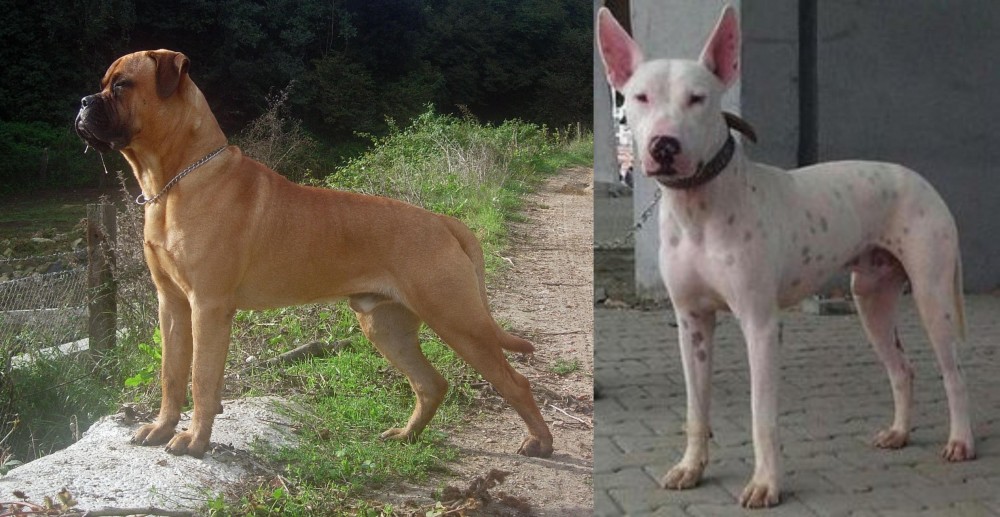 Bullmastiff is originated from United Kingdom but Gull Terr is originated from Pakistan. Both Bullmastiff and Gull Terr are having almost same height. Bullmastiff may weigh 14 kg / 31 pounds more than Gull Terr. Both Bullmastiff and Gull Terr has same life span. Both Bullmastiff and Gull Terr has almost same litter size. Both Bullmastiff and Gull Terr requires Low Maintenance.
Bullmastiff is originated from United Kingdom but Gull Terr is originated from Pakistan. Both Bullmastiff and Gull Terr are having almost same height. Bullmastiff may weigh 14 kg / 31 pounds more than Gull Terr. Both Bullmastiff and Gull Terr has same life span. Both Bullmastiff and Gull Terr has almost same litter size. Both Bullmastiff and Gull Terr requires Low Maintenance.
 The Old English Mastiff as well as the Bulldog are the breeds behind the Bull Mastiff. The Bullmastiff was originally developed in England around the 1860’s. Gamekeepers in England wanted a large, brave, robust dog which could help with keeping poachers away from their large estates which kept game.
The Old English Mastiff as well as the Bulldog are the breeds behind the Bull Mastiff. The Bullmastiff was originally developed in England around the 1860’s. Gamekeepers in England wanted a large, brave, robust dog which could help with keeping poachers away from their large estates which kept game.
As these large estates dwindled, so did the need for the services of the Bullmastiff and later they were simply bred to be family companions. As more Old English Mastiffs were bred, the dog became lighter, so that light tan or fawn became the preferred color.
The breed was officially recognized by the English Kennel Club in 1924, and the American Kennel Club in 1933.
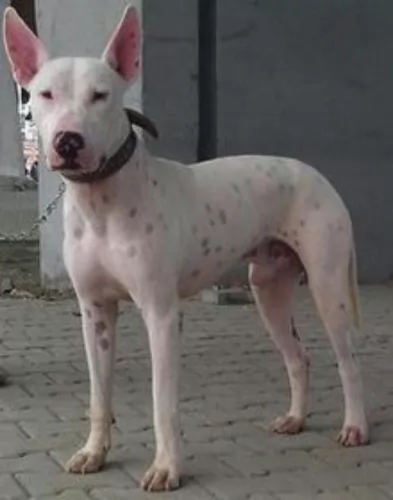 The Gull Terr hails from Pakistan. Having been introduced to the country by the British Raj, the dog has always been valued for its guarding and fighting abilities.
The Gull Terr hails from Pakistan. Having been introduced to the country by the British Raj, the dog has always been valued for its guarding and fighting abilities.
The British army, on bringing English Bull Terriers with them, mated them with local dogs. The dog was in other words, created from the old bull terrier which became extinct, and the Bully Kutta.
The Gull Terr or Pakistani Bull Terrier as he is known is a rare breed of dog. Today they are usually found in rural areas of Pakistan as well as in the Indian Panjab area, becoming popular as both pet and watchdog. It is no longer used for dog fighting as this has been banned.
 Bullmastiffs are large, brachycephalic dogs, and heights are between 61 and 68cm and the dog weight anything between 41 – 59kg. While it isn’t particularly tall, the dog is thickly set with a deep chest and strong, muscular legs. The Bull Mastiff has a powerful build and plenty of strength with an imposing look on his face. He is a powerful, active breed with a short coat which is also weather resistant and can be any shade of fawn, red or brindle.
Bullmastiffs are large, brachycephalic dogs, and heights are between 61 and 68cm and the dog weight anything between 41 – 59kg. While it isn’t particularly tall, the dog is thickly set with a deep chest and strong, muscular legs. The Bull Mastiff has a powerful build and plenty of strength with an imposing look on his face. He is a powerful, active breed with a short coat which is also weather resistant and can be any shade of fawn, red or brindle.
The dog has a black muzzle and the skull is large and square. The ears are set high and are short and floppy. The tail was once docked, giving the dog an even more distinctive, powerful appearance, but these days, due to regulations, the tail is left long.
The Bullmastiff is a loyal, devoted, fearless, protective dog. When he belongs to a human family, he becomes a companion but a fierce protector too, being a territorial dog. They love being with their family and can be good with children too, and even other pets, but proper training and socialization will be important. They aren’t aggressive around strangers, though he does make a wonderful guard dog.
He is intelligent and stubborn and if you don’t want him becoming destructive, even though he is a low-energy dog, you will need to exercise him and walk him every day.
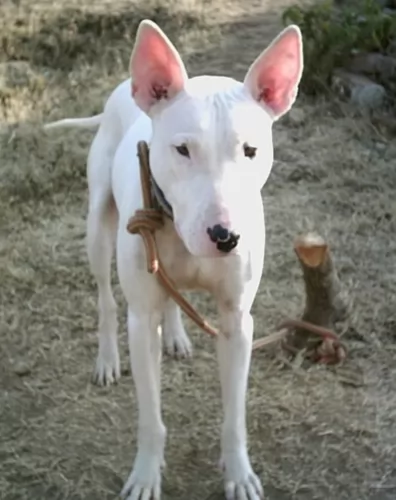 As a medium sized dog, the muscled Gull Terr stands as 45 – 66cm in height and weighs in the area of 40 – 45kg.
As a medium sized dog, the muscled Gull Terr stands as 45 – 66cm in height and weighs in the area of 40 – 45kg.
The dog has a short, smooth coat which is white, but you may find some black spots on him. He has a egg shaped head, ears are naturally erect, dark slanted eyes, and he has a long tail which is held upwards. Muscled and agile, he is a powerful working breed and makes a good watchdog.
This is an aggressive dog breed, and first-time dog owners might want to have a more amicable kind of pet to start off with.
He is a fearless dog, somewhat aggressive and suspicious towards strangers and therefore wants to protect his owner from them. With training and socialization he can be good with children in the home, although he is inclined to be boisterous and stubborn. He has fierce protective instincts, even though he is considered not as aggressive as some other Pakistani dog breeds.
The Gull Terr will need an experienced dog handler. Even though he has been a fighter in his day, he is capable of being an excellent family pet as well. You won't have trouble training him as he is intelligent. He then becomes more obedient and more manageable. He is a very active dog and therefore he won't fit into city dwelling where there are small spaces. He needs a place to run and on top of that he will require a good deal of exercise.
 Contrary to his formidable looks, the Bullmastiff is a gentle, affectionate pet when he has been properly socialized. He is a great pet for families and will guard them with his life. He is loyal and devoted but can be somewhat aloof, particularly with strangers.
Contrary to his formidable looks, the Bullmastiff is a gentle, affectionate pet when he has been properly socialized. He is a great pet for families and will guard them with his life. He is loyal and devoted but can be somewhat aloof, particularly with strangers.
He isn’t a highly energetic dog and he is more or less low maintenance and easy-going. Feed him correctly, give him a nice, warm sleeping spot to call his own and give him attention like he deserves as a family member. The Bullmastiff will reward you by being a solid and devoted companion.
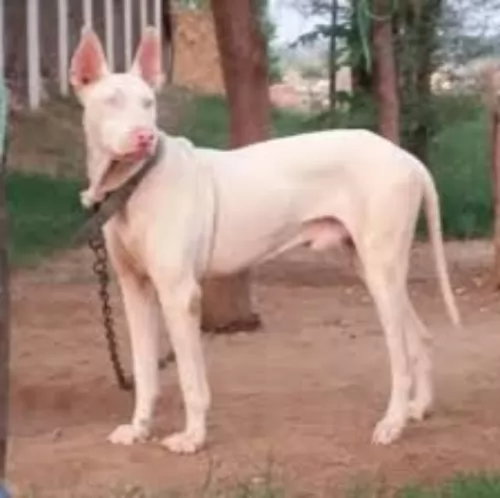 Your Gull Terr love the attention he receives from his human family and he won’t flourish at all if he is put into the back yard for watch dog purposes only. He is a dog that needs to come indoors to be with his family.
Your Gull Terr love the attention he receives from his human family and he won’t flourish at all if he is put into the back yard for watch dog purposes only. He is a dog that needs to come indoors to be with his family.
He tends to be somewhat aggressive and this is why he isn’t looked upon as the ideal pet for first-time dog owners and those with young children in the home.
He is a confrontational dog, willing to enter into a fight with provocation. Strong willed he will require early training and socialization, and when he is brought up by a firm, consistent, kind owner, he can get over his aggression and become a loyal, devoted, protective and loving pet.
 The Bullmastiff is a generally healthy breed, but even so, the breed is known for having to contend with certain health issues. He doesn’t have a particularly long life span either and can live to be about 10, ll or 12 years of age. Some of the more common illnesses to look out for include -
The Bullmastiff is a generally healthy breed, but even so, the breed is known for having to contend with certain health issues. He doesn’t have a particularly long life span either and can live to be about 10, ll or 12 years of age. Some of the more common illnesses to look out for include -
This is a condition where the thighbone doesn’t fit properly into the hip joint. The troublesome part is that it can lead to arthritis, pain and lameness for your pet.
This is a worrisome, life-threatening condition for a dog, particularly for large, deep-chested dogs such as your Bullmastiff. Instead of feeding your Mastiff one large meal, it is recommended to feed him 2 smaller meals. Bloat occurs when the stomach is distended with gas or air and twists, restricting the normal return of blood to the heart.
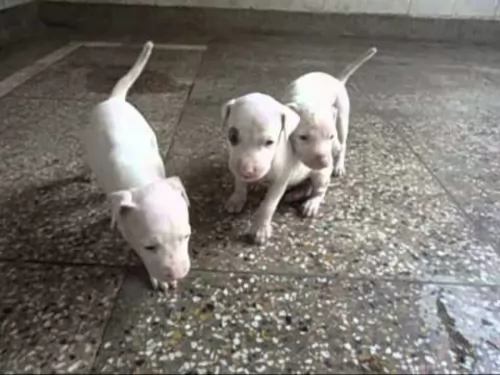 The Gull Terr has a deep chest and this means he is more prone to bloat, a condition known as gastric dilation volvulus.
The Gull Terr has a deep chest and this means he is more prone to bloat, a condition known as gastric dilation volvulus.
Your pet's stomach fills with air and this leads to decreased blood flow to vital organs. The stomach can twist and this is when the condition becomes life threatening as blood supply to the stomach is cut off. Instead of feeding him large meals, feed him smaller meals more frequently.
Deafness in your pet can be temporary or permanent, in one ear or both. There are are so many reasons why your pet could be deaf and it could be a birth defect, an infection or old age. Certain dogs such as the white coated Gull Terr are also more predisposed to congenital deafness.
Get him to the vet who will examine your dog’s ear canal for wax and debris and discuss the way to go for your beloved pet.
 The Bullmastiff has a short dense coat which is looked upon as low-maintenance. He will require a brushing twice a week, being a light to average shedder. He is a dog that tends to drool quite a bit so you may need to wipe away slobber from time to time. Because his face has wrinkles, check the creases to ensure they remain free of dirt and food particles to ward off infection.
The Bullmastiff has a short dense coat which is looked upon as low-maintenance. He will require a brushing twice a week, being a light to average shedder. He is a dog that tends to drool quite a bit so you may need to wipe away slobber from time to time. Because his face has wrinkles, check the creases to ensure they remain free of dirt and food particles to ward off infection.
Check his ears at the same time, brush his teeth at least twice a week with special dog-toothpaste and brush and keep the nails trimmed.
Your large Bullmastiff will require high-quality commercial dog food but he will also need some home-made food in between such as rice, vegetables and meat. He is a large dog and will have to get an intake of raw meat too. Dogs denied raw meat can end up with skin problems as well as other health issues.It is better to feel your Bullmastiff smaller meals than to give him one large meal which he scoffs down quickly. Smaller meals will help prevent the most dangerous illness known as Bloat.
Ensure he has a steady supply of fresh, cool water.
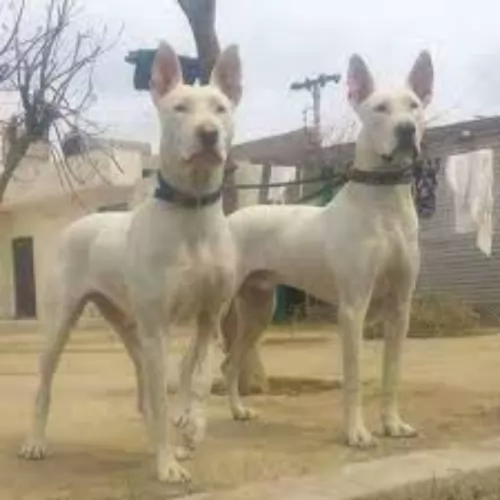 Easy to look after with his short coat, the Gull Terr will only require a brushing twice a week to keep the coat shiny and healthy.
Easy to look after with his short coat, the Gull Terr will only require a brushing twice a week to keep the coat shiny and healthy.
Because his coat is white, it can show dirt easily, and it will simply require taking a damp cloth and wiping the mark off him. You don't want to be bathing him often as this dries his skin out – rather just wipe the coat down.
Your Gull Terr is a highly energetic dog and he loves nothing more than to be involved in robust exercise and games. He is best suited in a home with large grounds and if you do opt to have him in the city, you will have to pay close attention to his exercise needs – lots of walks, runs, ball games, swimming and running with you as you cycle.
You want to be sure that your energetic Gull Terr has a healthy diet full of important proteins, fats, and carbohydrates.
Protein is always important for a dog like this and you want to make absolutely sure that apart from his high quality kibble, you mix in raw meat from time to time as well as cooked chicken, fish, brown rice and vegetables.
When looking for a commercially manufactured dog food, look for high-quality animal protein as a top ingredient. Make sure he always has fresh, cool water available to him.